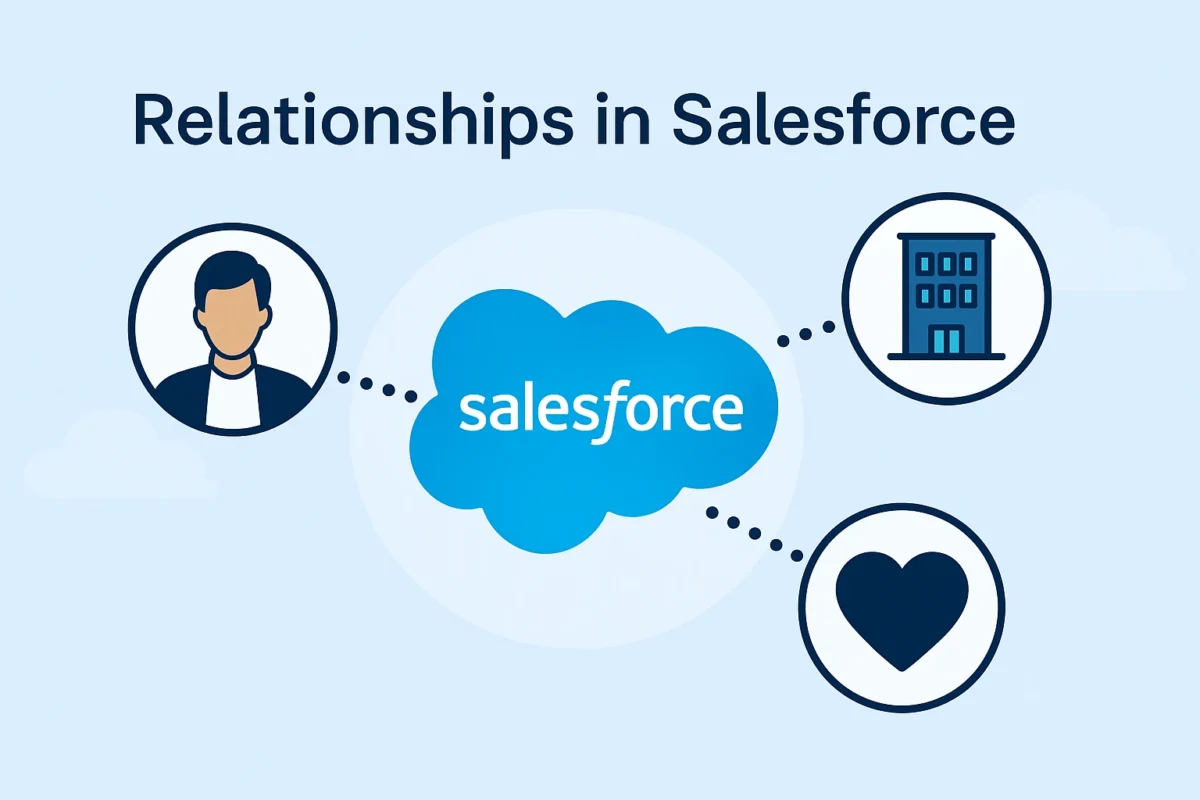
Salesforce is a powerful CRM platform that thrives on data — but that data is most meaningful when it’s connected. That’s where relationships in Salesforce come into play. Whether you’re managing customer records or building scalable data models, understanding how different objects relate to each other is essential for effective Salesforce development and administration.
What Are Relationships in Salesforce?
Relationships in Salesforce are connections between different Salesforce objects. These relationships allow users to link records and create complex data models that reflect real-world interactions between people, processes, and data.
Salesforce supports two main types of relationships:
-
Lookup Relationships
-
Master-Detail Relationships
Let’s dive deeper into each.
1. Lookup Relationships
A Lookup Relationship in Salesforce is a loosely coupled relationship between two objects. It’s similar to a “reference” where one object can point to another without enforcing strict dependency.
Example:
You can link a Contact to an Account, but deleting the Account won’t delete the Contact.
Key Features:
-
Optional or required (depending on field settings)
-
No automatic data sharing
-
Child records can exist independently
2. Master-Detail Relationships
A Master-Detail Relationship is a tightly coupled relationship. The child (detail) record is strongly dependent on the parent (master) record.
Example:
A Sales Order (child) tied to a Customer Account (master). Deleting the Customer deletes related Sales Orders.
Key Features:
-
Cascade delete enabled
-
Detail records inherit security and ownership
-
Roll-up summary fields available on the master object
Self Relationships
Salesforce also supports self-relationships, where an object relates to another record of the same object. This is useful for creating hierarchies — for example, managing managers and subordinates within an Employee object.
Hierarchical Relationships
Hierarchical relationships in Salesforce are exclusive to the User object. It allows a user to be linked to another user, often used to reflect managerial relationships or approval chains.
Why Are Relationships in Salesforce Important?
-
Data Integrity: Ensures connected records stay valid.
-
Simplified Reporting: Related records can be pulled into reports easily.
-
Improved Automation: Workflows and processes can span multiple related objects.
-
Scalability: Enables modular data modeling and future-proofing.
Use Cases of Relationships in Salesforce
| Use Case | Relationship Type |
|---|---|
| Contacts linked to Accounts | Lookup |
| Order Line Items with Orders | Master-Detail |
| Organizational Hierarchies | Self or Hierarchical |
| Cases assigned to Products | Lookup or Master-Detail |
-
Use Master-Detail when the child record cannot exist without the parent.
-
Choose Lookup for loosely associated data.
-
Be mindful of record-level security and ownership rules.
-
Use custom relationships strategically to avoid data clutter.
-
Avoid circular references and overly complex relationship chains.
FAQs About Relationships in Salesforce
Q1. What is the difference between Lookup and Master-Detail relationships in Salesforce?
A Lookup is loosely coupled and optional, while Master-Detail is tightly coupled and dependent, including features like cascade delete and roll-up summaries.
Q2. Can you convert a Lookup Relationship to a Master-Detail?
Yes, but only if all existing child records have a parent and the field is marked as required.
Q3. How many relationships can an object have in Salesforce?
A custom object can have up to 40 relationships (including lookup and master-detail combined).
Q4. What is a self-relationship in Salesforce?
A self-relationship allows an object to relate to another record of the same object, useful for hierarchies like employee-manager structures.
Q5. Are roll-up summary fields available in Lookup relationships?
No, roll-up summaries are only available in Master-Detail relationships, unless you use custom code or declarative tools like Flow or Apex.
You may like : Platform Event Trap
Conclusion
Understanding and implementing relationships in Salesforce effectively is key to building a scalable, maintainable, and user-friendly CRM system. Whether it’s a simple lookup or a complex master-detail chain, each relationship type has its role in connecting your Salesforce data model.
By mastering relationships, you unlock the full potential of Salesforce’s relational architecture — enabling smarter automation, cleaner data, and better insights.

